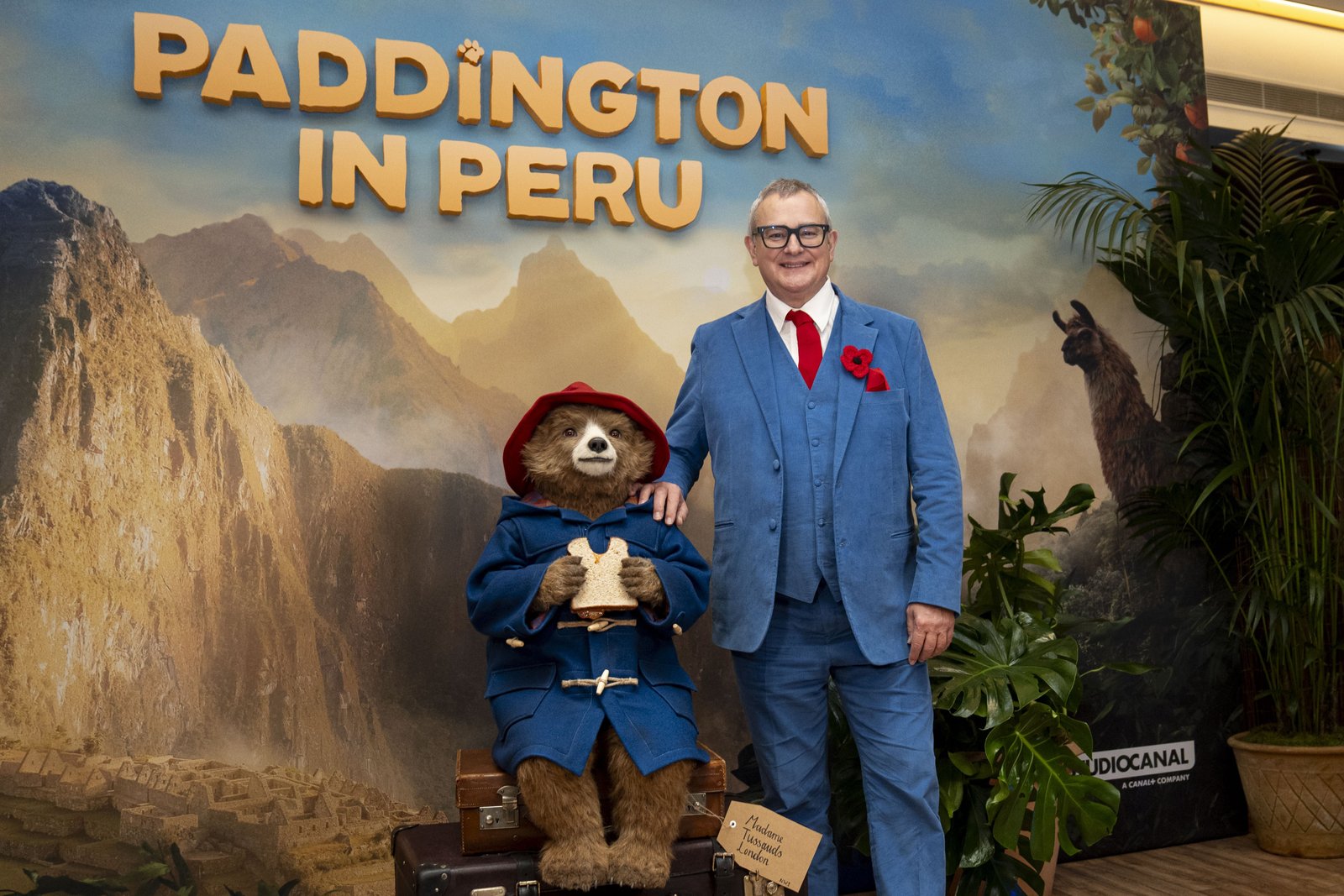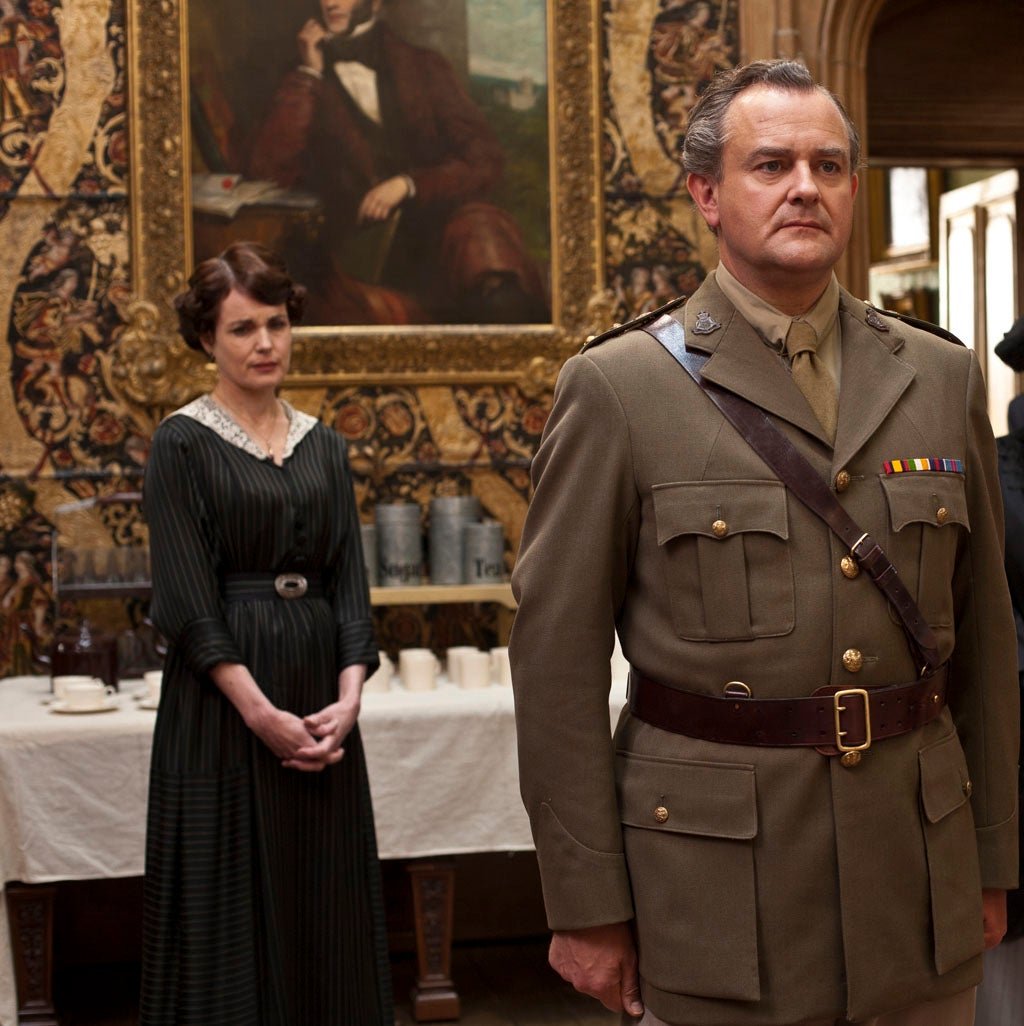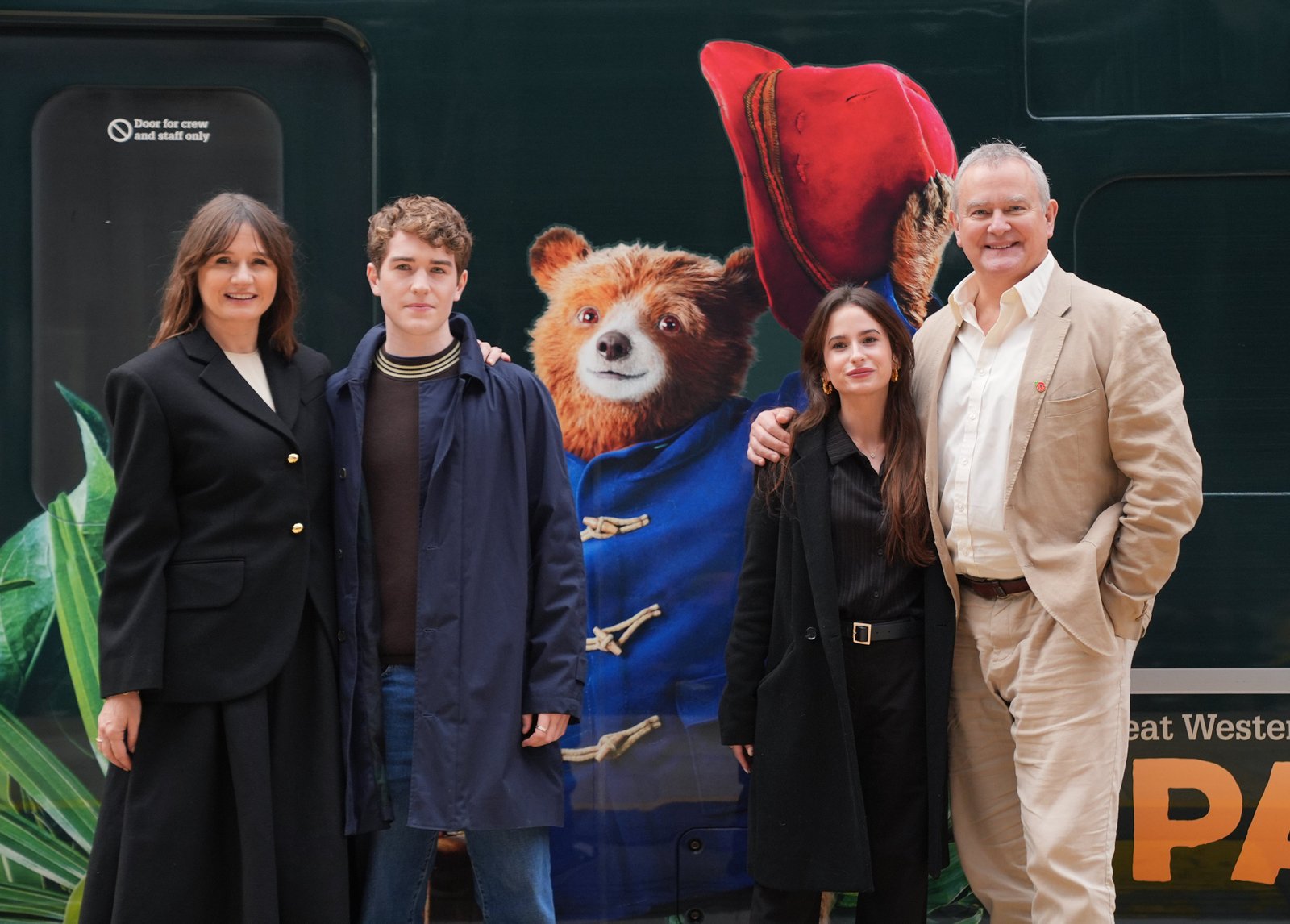Mr Brown is very nice. I can’t tell you how much of a relief it is to write those words. Yes, I’m aware that Hugh Bonneville is merely an actor and an entirely separate entity to his beloved – and, crucially, fictional – character in the Paddington film franchise. Still. I’m not sure my inner child could have coped with our favourite Peruvian bear’s adoptive British dad being, well, nasty.
Luckily, Bonneville, equally known for his 15-year stint as Downton Abbey’s Lord Grantham, is anything but – the 61-year-old is all easy charm, smiling eloquence and thoughtful, genuine answers when I chat to him over Zoom. He somehow manages to exude warmth, even through the clinical blue light of a screen. Indulging my inner child is probably the order of the day anyway, given that we’re here to chat about his latest non-acting venture: a children’s book entitled Rory Sparkes and the Elephant in the Room. It’s his first foray into fiction and second literary endeavour following the self-penned 2022 memoir Playing Under the Piano. As it turns out, the latter unwittingly ended up inspiring the former.
“I wrote a rather too substantial chunk about my childhood, to the extent that the editor said, ‘I’m getting a bit bored. Could we move the narrative on a bit, please?’” he recalls wryly. “But maybe, on reflection, that meant that I quite enjoyed exploring my childhood, or at least had very vivid recollections of it.”
In fact, both the story and characters in Rory Sparkes are very much plucked from Bonneville’s own memories. The book charts the adventures of the eponymous Rory, a tall, red-headed bundle of energy who, with his preference for putting on theatrical performances, is clearly a slightly embellished stand-in for Bonneville himself. Rory befriends some new children who are part of the travelling circus that’s come to town; the “elephant” of the title is based on a pet pachyderm, on whom the circus kids would sometimes ride to Bonneville’s school. “That’s completely true,” he tells me. “Looking back, I realised that maybe life in leafy southeast London wasn’t quite so boring as I thought…”
While he was initially resistant to the idea of writing for children – “I knew I didn’t have any wizards or chocolate factories in me” – it quickly became apparent that Bonneville had more than enough extraordinary tales to draw on from real life. “I did make it plain that there would be no time travel or clever things,” he says, somewhat apologetically, “It was just a very ordinary, slightly Swallows and Amazons account of life in my childhood – without the river and the trees.” Notably and intentionally, it’s a simple world with no screens in it. “Frankly, I find it far more enjoyable than a lot of modern life,” he adds. “It was a nice world to escape to.”
Bonneville’s own upbringing in the Sixties and Seventies was a world away from the one that today’s youngsters are forced to contend with. Forget phones and social media, he was given 2p for the phone box in case of emergency and sent off to play. He grew up in Blackheath, the son of a urological surgeon and a nurse (who went on to secretly work for MI6, a fact Bonneville only found out decades after her retirement, though she insisted she only “did filing”). The youngest of three, Bonneville had both a big sister and big brother to contend with. At one point, he plotted to kill the former, even going so far as to dig a shallow grave for her in the garden.

“I wasn’t lonely, but I was quite alone,” he says of those formative years after both siblings went off to boarding school. “I had to make my own fun, really.” And fun, in Bonneville’s case, involved diving into the dressing-up box and donning exotic garb from his parents’ former travels. “I used to dress up in this bizarre array of a formal naval mess jacket with a sort of djellaba [robe] on top and curled up shoes from Thailand, call myself the Sultan of something or other, and do these plays on the landing,” he recounts fondly. He’d strong-arm his mates into getting involved – in exchange for being the reluctant goalkeeper in their “stupid” games of football. “It was a very strange little world that we had; I lived for doing plays and making up stories and my imaginary friends,” he recalls. It all set the scene for a career in make-believe that’s now spanned more than 35 years. From starting on stage with the National Theatre followed by a stint at the Royal Shakespeare Company in the Eighties and Nineties, Bonneville went on to deliver scene-stealing performances in films including Tomorrow Never Dies, Notting Hill and Viceroy’s House, while TV roles in everything from Daniel Deronda and The Gold to Twenty Twelve and W1A have seen him glide smoothly between comedy and high drama.
Now, those storytelling seeds have come to fruition via a different medium. But even with such a rich seam of early experiences to mine, writing a children’s book is never easy. It’s one of those annoying things, in fact, that everyone is convinced they could do themselves, while never stopping to wonder why they haven’t ever attempted it. “It is one of the hardest skills ever,” Bonneville agrees – though he took inspiration from having previously played one of the greatest children’s authors of all time, Roald Dahl, in the 2021 film To Olivia. “He went to his hut with a yellow door, and he wrote for two hours in the morning and two hours in the afternoon,” says Bonneville. “And when I sat down, I thought, ‘Lightweight! I can stick in eight hours a day. You watch me.’ And of course, after about four hours of writing, it’s just not the same…”
Like so many authors before him, he quickly discovered the joy in realising that one’s characters have a mind of their own. “It is such a cliche, but once they start talking to you, or start telling the story, they just take over,” he says. “And it’s magical. It’s wonderful. I was reading through it the other day and I thought, ‘I don’t remember writing that!’ The characters made it up as they went along.”
Cancel culture is there and utterly without a jury or due process. People are guilty as smeared, rather than guilty as charged
One of the characters in particular, Rory’s dad, may well resonate with jaded parents reading the book to their offspring. J.P. Sparkes has big, long-thwarted dreams: he’s always wanted to ride a motorbike to see the Northern Lights. In the book, he ends up buying one – a Triumph Bonneville, which, yes, was a deliberate nominative choice – his family’s scepticism be damned. Did Bonneville have a similar knee-jerk reaction to getting older, not a mid-life crisis, as such, but a mid-life desire to carpe the diem?
“Yes, and I can tell you exactly when it was. My brother died suddenly in his sleep [Nigel Bonneville passed away in 2017] and so the next day, I went and bought the soft top convertible I’d always wanted. I planted the copper beech tree I’d been meaning to plant for 20 years. Because it made me realise just how utterly… what’s the word, roulette? How much of a roulette life is.” He ended up selling the car a year later, but “that instinct had kicked in… Try and make it count, try and make it matter, try and do it now.” He cites the mother of his mentor, actor Celia Imrie, whose mantra boils it down to: “Do it now”.
Age, too, has made him philosophical but also more passionate about being a force for good where he can. “I’ve got friends who’ve died and you think, we’re only here once,” says Bonneville. “We’re not learning from the past about how we treat each other. Those tragedies rhyme throughout history. What can we do to make our final chapters positive in some way?” He’s not, Bonneville is keen to clarify, suggesting he’ll have any great impact on the world. “But just to try to make things a little kinder, a little calmer, a little more generous – so that the next generation isn’t full of despair.”

These words could have been plucked straight out of one of the phenomenally popular Paddington films, all three of which Bonneville has starred in as risk assessor-turned-risk taker Henry Brown. The ideology quietly championed by the late Michael Bond, the author behind the books that inspired the movies, has clearly had an impact. “The simplicity and honesty and integrity of Paddington as a character shines through – and, obviously, the very heart of Paddington is the outsider looking for home,” Bonneville muses. “And my goodness, does that resonate around the world: be it a refugee evacuee on a platform at Paddington Station in the Second World War or, let’s face it, what’s happening in too many spots around the world, with displaced people looking for the hand of friendship.”
On the question of whether humankind is inherently good or bad, Bonneville remains an optimist in the mould of the bear himself: “I think we are, as creatures, instinctively kind – but there are many dark forces at work that try not to be kind.”
Bonneville hasn’t been afraid to put his money where his mouth is when it comes to speaking up for the outsider in real life. A clip of him on the red carpet at the Downton Abbey: The Grand Finale premiere last month swiftly made headlines around the globe. “Before I talk about the fluff and loveliness of our wonderful film, what’s about to happen in Gaza City is indefensible,” he said to a shocked ITV reporter. “The international community must do more to bring it to an end.”
I just want to be part of something that can stop human suffering
He could never have imagined what a huge response this 10-second soundbite would elicit. “I was utterly blown away and bowled over and humbled and astonished by the reaction that I got – literally thousands of people getting in touch, thanking me for saying something. I had no idea how voiceless most people feel, how scared most people are.” Bonneville is quick to inject this comment with his signature humility – “I’m no flipping hero or flag waver or anything” – but, clearly, the reason his words had such a profound impact is that not everyone is willing to stick their head above the parapet. Describing himself as “resolutely” apolitical (he always reserves the right to change his mind or be persuaded), Bonneville nevertheless remains compelled to call out a situation where atrocities are being committed. “I just don’t like inhumanity when I see it,” he says simply. “I have made no political comment about the rights and wrongs of the Middle Eastern situation other than the famine and the annihilation of a group of people who are being shot at like fish in a barrel. I just want to be part of something that can stop human suffering.”

Having starred in 2024’s excellent Steven Moffat-penned series Douglas is Cancelled, about a newsreader who finds himself in the midst of a trial by media after he’s accused of making a sexist joke, did Bonneville worry about the implications of speaking out? No, he says – but he can certainly see why other people might. “Anything anyone says now is scrutinised by the mob, and I understand why people prefer to be absolutely silent,” he says. “Sometimes you do feel the need to speak up, but cancel culture is there and utterly without a jury or due process. People are guilty as smeared, rather than guilty as charged.”
So what next for the actor-slash-budding children’s author? There’ll definitely be more in the Rory Sparkes series; Bonneville is already hard at work on the second book. On the thesp side of things, he’s just finished shooting series two of Guy Richie’s The Gentlemen for Netflix, plus a show called 2026 – a spin-off of the Twenty Twelve and W1A mockumentaries in which he reprises his role as beleaguered manager Ian Fletcher. “My character is being parachuted in as head of integrity at a major world football organisation,” he says with a twinkle. “What could possibly go wrong?”
And what about Paddington, I ask hopefully? A fourth film has been confirmed by Studiocanal, the franchise’s producer, though firm details of a release date or cast members have yet to be announced. “Honestly… No. Much as I love the bear, I think unless you’ve got Mr Brown in a bath chair, it’s probably time to find younger blood.”
I won’t lie. My inner child bursts into tears and throws a tantrum at the news. But whatever lies in store for Bonneville, he’ll always be Mr Brown to me.
‘Rory Sparkes and the Elephant in the Room’ by Hugh Bonneville (Bloomsbury, from £8.99) is out on 9 October and available to pre-order now. Bonneville will appear at the Henley Literary Festival on 11 October. Click here to buy tickets

